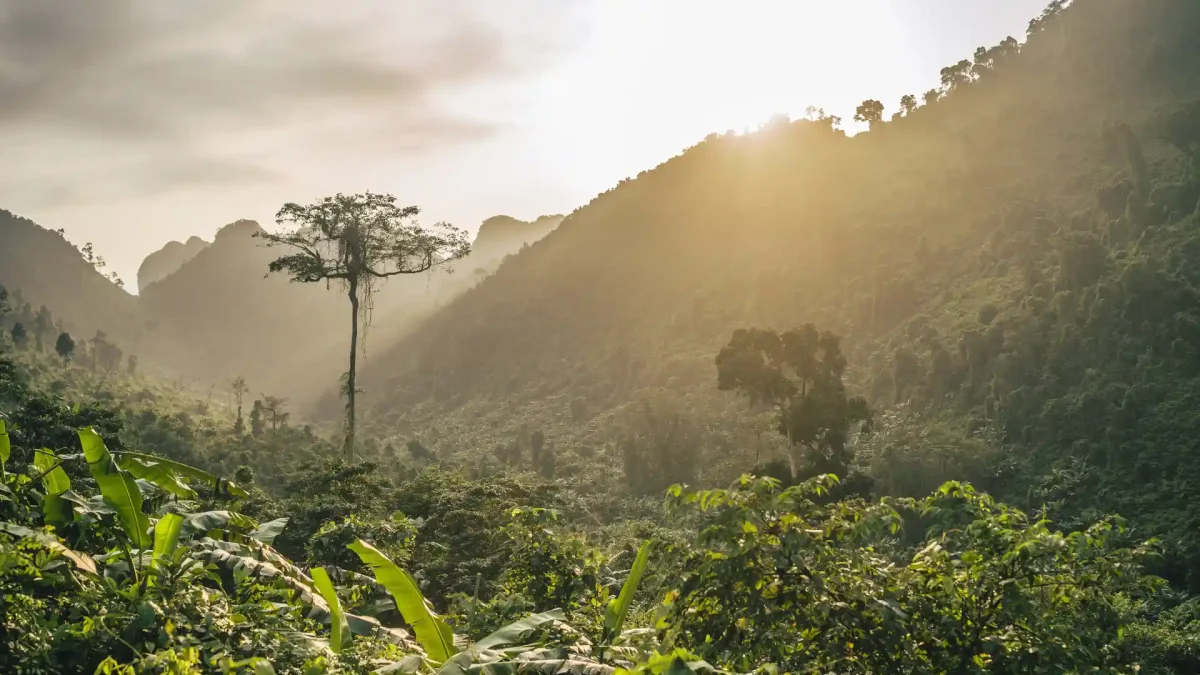Regenerative development: A new vision for the future
Holism in ancient philosophy

The concept of holism has its roots in ancient philosophy, especially in Greek and Eastern traditions. Holism is the idea that systems and their properties should be analyzed as wholes, not just through their constituent parts (Smuts, 1926). In ancient Greece, philosophers like Plato and Aristotle developed ideas that implied an integral vision of the universe. In his book “The Republic,” Plato argued that the cosmos is a living being with a soul. At the same time, Aristotle saw nature as a teleologically organized system where everything has a purpose and contributes to the common good of the universe.
In Eastern philosophies such as Taoism and Buddhism, holistic concepts are also found. The Tao, in Taoism, is a unifying force that interconnects all things. In Buddhism, interdependence is a fundamental principle that states that all things are interconnected and that nothing exists independently (Garfield, 1995). In this sense, a milestone text in the development of deep ecology is Fritjof Capra’s book “The Tao of Physics” (Capra, 2005), which reveals deep connections between Eastern spirituality and modern science. Undoubtedly, it is a book that every environmental science enthusiast should read.
Christianity, despite its often instrumental view of nature—largely due to a misinterpretation of the scriptures—has also had great men who understood themselves as part of a unifying whole. Francis of Assisi (the father of ecology), a Catholic saint, exemplifies an austere thought where man is a creature and brother of all creation. The Canticle of the Creatures is one of the most beautiful Christian hymns. The Franciscan worldview is pristinely reflected in Pope Francis’s encyclical “Laudato Si,” a text that bridges the divide between the thought of living systems and humans in what the pontiff calls “Integral Ecology.”
On the other hand, the holistic vision is not exclusively European or Eastern. Although Indigenous communities have been sidelined from history (George Orwell once expressed, “History is written by the victors”), despite a largely absent written tradition, current ethnographic studies and cultural studies, in general, provide accounts of profound ecological worldviews. Indigenous cosmogonies narrate interdependence and systemically understand the natural world.
The holistic vision of ancient philosophy contrasts with the fragmentation characteristic of modern approaches. In a world where specialization and detailed analysis of individual components dominate, holism offers an integrative perspective essential for addressing complex problems, such as environmental issues, that require an understanding of the global system.
The difficulties of scientific mechanism

Mechanism, which has been the basis of scientific thought since the 17th-century scientific revolution, treats the universe as a machine composed of separate parts that interact in predictable and quantifiable ways. This Cartesian heritage has enabled significant advances in science and technology, but it has also encountered its limitations, especially in the context of complex and dynamic systems such as ecosystems and human societies.
One of the main difficulties of the mechanism is its inability to address emergence and complexity. Complex systems, such as ecosystems, exhibit emergent properties that cannot be predicted simply by summing the properties of their constituent parts (Kauffman, 1993). Moreover, the mechanism tends to ignore the interconnections and relationships between parts, which is crucial for understanding phenomena such as climate change and biodiversity loss.
Mechanism has also led to a reductionist view of the world, where nature is seen as a resource to be exploited rather than a living system in balance on which we depend (Merchant, 1980). This view has contributed to the current environmental crisis by promoting unsustainable and destructive practices.
The global crisis and the insufficiency of sustainable development

The global crisis we face today is multifaceted, encompassing environmental, economic, social, and political aspects. Environmental degradation, climate change, biodiversity loss, and growing economic inequality are just some of the problems that underline the insufficiency of the sustainable development model.
The concept of sustainable development, popularized by the Brundtland Report in 1987, seeks to meet the needs of the present without compromising the ability of future generations to meet their own needs (World Commission on Environment and Development [WCED], 1987). However, this approach has been criticized for not adequately addressing the underlying causes of environmental degradation and for perpetuating an economic model that remains exploitative and extractivist (Kothari, Demaria, & Acosta, 2014).
Sustainable development has primarily focused on mitigating the environmental and social damages of economic development but has not fundamentally questioned the paradigms and practices that lead to these damages. Instead of merely reducing the negative impact, a focus that regenerates and revitalizes natural and social systems, promoting a dynamic and healthy balance, is needed.
The emergence of deep ecology in the context of global environmental crisis

In response to the global environmental crisis and the limitations of sustainable development, deep ecology has emerged as a philosophical and ethical perspective that proposes a more respectful and harmonious relationship with nature. Deep ecology, developed by Norwegian philosopher Arne Næss in the 1970s, posits that all forms of life have intrinsic value and that humans have no right to reduce this richness and diversity except to meet vital needs (Næss, 1973).
Deep ecology advocates for a fundamental transformation of our worldviews and practices. It proposes a shift from an anthropocentric to an ecocentric perspective, where humans are an integral part of the web of life and not dominators of nature. This approach resonates with ancient holistic traditions and offers a solid ethical foundation for regenerative development.
The global environmental crisis has made it clear that superficial and palliative approaches are not enough. A profound reevaluation of our values, goals, and methods is required, and deep ecology provides a guide for this reevaluation, promoting a worldview that recognizes the interdependence and coevolution of all beings.
Regenerative development: A step beyond sustainability

Regenerative development represents an evolution of the sustainability concept, aiming not only to reduce negative impact but also to regenerate and revitalize natural and social systems. Daniel Christian Wahl, in his book “Designing Regenerative Cultures”, defines the paradigm shift as a holistic process:
“In regenerative cultures, personal development and the evolution of consciousness will accelerate. As we cease to be paralyzed by the fear-driven cycle of separation, scarcity, and the struggle for control and power, we will begin to unfold the potential of a compassionate, empathic, and collaborative culture of creativity and shared abundance, driven by biophilia – our innate love for all of life. The narrative of separation from the rest of life and alienation from nature’s wisdom is beginning to give way to a narrative that celebrates our communion with nature as the very essence of our being” (Wahl, 2016, p. 52).
The history of regenerative development is linked to the evolution of various disciplines and movements advocating for a more balanced and healthy relationship with nature. From permaculture and agroecology to ecological economics and biomimicry, regenerative development integrates knowledge and practices from multiple fields to create resilient and adaptive systems.
Regenerative development is based on design principles that mimic natural processes, promoting biodiversity, resilience, and adaptability. This approach recognizes the interdependence of all living systems and seeks to create conditions that favor the coevolution and prosperity of all forms of life.
Regenerative development also emphasizes the importance of culture and community in creating sustainable systems. It is not just about technical practices but a profound change in how communities think, feel, and act about their environment. Education, community participation, and collaboration are essential elements for the success of regenerative development.
Regenerative development applied to tourism

Tourism is one of the largest and fastest-growing industries in the world, and its impact on the environment and local communities is significant. Traditional tourism has often contributed to environmental degradation, biodiversity loss, and the exploitation of local communities. In contrast, regenerative development applied to tourism seeks to create experiences that not only minimize negative impact but also actively contribute to the regeneration of ecosystems and communities.
Regenerative tourism is based on principles that promote sustainability, resilience, and regeneration. This includes practices such as biodiversity conservation, ecosystem restoration, the use of renewable energy, and support for local economies. Additionally, regenerative tourism emphasizes the importance of education and awareness for both tourists and host communities.
An example of regenerative tourism is the implementation of eco-lodges that not only operate sustainably but also participate in habitat restoration and the promotion of local biodiversity. These projects always involve local communities in design and management, creating economic opportunities and strengthening social cohesion.
Regenerative tourism can also play a crucial role in cultural conservation by supporting local traditions and fostering respectful and enriching cultural exchange. By focusing on the regeneration of natural and social systems, regenerative tourism offers a vision of how the tourism industry can contribute positively to the planet’s health and vitality.
The purpose of our editorial project

The need for a regenerative approach in tourism is more urgent than ever, given the significant impact of this industry on the environment and communities. Our editorial project is dedicated to exploring and promoting regenerative development applied to tourism, providing information, resources, and examples of good practices.
We invite our readers to follow our content, where we will share case studies, expert interviews, policy analyses, and practical guides for implementing regenerative development in tourism projects. We believe that through education and collaboration, we can foster tourism that is not only sustainable but also actively contributes to the regeneration of ecosystems and communities.
Regenerative development in tourism is an opportunity to redefine the relationship between tourists, host communities, and the environment. By adopting regenerative practices, we can transform tourism into a positive force that restores and revitalizes our planet. Through this blog, we aim to inspire and empower individuals, organizations, and communities to become agents of change, promoting tourism that is truly beneficial for all living beings and the planet as a whole.
In conclusion, regenerative development is a transformative vision that goes beyond sustainability, offering a path toward a future where natural and human systems can thrive together. Our editorial will be a space dedicated to exploring this vision in the context of tourism, providing tools and knowledge for those who wish to contribute to a more regenerative and balanced world. We invite all interested parties to join us on this journey towards a better future, where tourism becomes a catalyst for ecological and social regeneration.
Bibliographic Sources
Capra, Fritjof. El Tao de la física / Fritjof Capra ; [traducido del inglés por Alma Alicia Martell Moreno]. 7a ed. Málaga: Sirio, 2005. Print.
Jay L Garfield. The fundamental wisdom of the middle way: Nagarjuna’s Mulamadhyamakakarika. 1st ed. Oxford: Oxford University Press, Incorporated, 1995. Print.
Kauffman, S. A. (1993). The origins of order: Self-organization and selection in evolution. Oxford University Press, USA.
Kothari, A., Demaria, F., & Acosta, A. (2014). Buen vivir, degrowth and ecological Swaraj: Alternatives to sustainable development and the green Economy. Development, 57(3–4), 362-375. https://doi.org/10.1057/dev.2015.24
Merchant, C. (1980). The death of nature: Women, ecology, and the scientific revolution.
Næss, A. (1973). The shallow and the deep, long‐range ecology movement. Inquiry, 16(1-4), 95-100. https://doi.org/10.1080/00201747308601682
Smuts, J. C. (1926). Holism and evolution. Macmillan.
Wahl, D. C. (2016). Designing Regenerative Cultures. Triarchy Press.
Regenerative development: A new vision for the future

